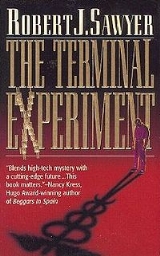
The Terminal Experiment
Encyclopedia
The Terminal Experiment is a science fiction
novel
by Canadian
novelist Robert J. Sawyer
. The book won the 1995 Nebula Award
for Best Novel
, and was nominated for the Hugo Award
for Best Novel
in 1996.
The story was first serialised in Analog magazine in the mid-December 1994 to March 1995 issues, under the name Hobson's Choice, before its first novel publication in May, 1995. A Hobson's choice
is an apparently free choice that is really no choice at all. In this book it is a play on the main character's name and describes the choice between immortality and provable life after death
.
Many references are made in the book to Star Trek
. At many times in the book, Net News Digest issues are "reprinted", similar to the news alert that many news organizations now offer. Though published in 1995, the novel is set in 2011 and one of these news alerts even refers to a statement made in 2011 by "Pope Benedict XVI."
Science fiction
Science fiction is a genre of fiction dealing with imaginary but more or less plausible content such as future settings, futuristic science and technology, space travel, aliens, and paranormal abilities...
novel
Novel
A novel is a book of long narrative in literary prose. The genre has historical roots both in the fields of the medieval and early modern romance and in the tradition of the novella. The latter supplied the present generic term in the late 18th century....
by Canadian
Canada
Canada is a North American country consisting of ten provinces and three territories. Located in the northern part of the continent, it extends from the Atlantic Ocean in the east to the Pacific Ocean in the west, and northward into the Arctic Ocean...
novelist Robert J. Sawyer
Robert J. Sawyer
Robert James Sawyer is a Canadian science fiction writer. He has had 20 novels published, and his short fiction has appeared in Analog Science Fiction and Fact, Amazing Stories, On Spec, Nature, and many anthologies. Sawyer has won over forty awards for his fiction, including the Nebula Award ,...
. The book won the 1995 Nebula Award
Nebula Award
The Nebula Award is given each year by the Science Fiction and Fantasy Writers of America , for the best science fiction/fantasy fiction published in the United States during the previous year...
for Best Novel
Nebula Award for Best Novel
Winners of the Nebula Award for Best Novel, awarded by the Science Fiction and Fantasy Writers of America. The stated year is that of publication; awards are given in the following year.- Winners and other nominees :...
, and was nominated for the Hugo Award
Hugo Award
The Hugo Awards are given annually for the best science fiction or fantasy works and achievements of the previous year. The award is named after Hugo Gernsback, the founder of the pioneering science fiction magazine Amazing Stories, and was officially named the Science Fiction Achievement Awards...
for Best Novel
Hugo Award for Best Novel
The Hugo Awards are given every year by the World Science Fiction Society for the best science fiction or fantasy works and achievements of the previous year. The award is named after Hugo Gernsback, the founder of the pioneering science fiction magazine Amazing Stories, and was once officially...
in 1996.
The story was first serialised in Analog magazine in the mid-December 1994 to March 1995 issues, under the name Hobson's Choice, before its first novel publication in May, 1995. A Hobson's choice
Hobson's choice
A Hobson's choice is a free choice in which only one option is offered. As a person may refuse to take that option, the choice is therefore between taking the option or not; "take it or leave it". The phrase is said to originate with Thomas Hobson , a livery stable owner in Cambridge, England...
is an apparently free choice that is really no choice at all. In this book it is a play on the main character's name and describes the choice between immortality and provable life after death
Afterlife
The afterlife is the belief that a part of, or essence of, or soul of an individual, which carries with it and confers personal identity, survives the death of the body of this world and this lifetime, by natural or supernatural means, in contrast to the belief in eternal...
.
Plot introduction
Dr. Peter Hobson invents a machine that detects a brain pattern that leaves the body after death, a pattern many believe is a soul. In order to test his theories on immortality and life after death, Dr. Peter Hobson, with his friend Sarkar Muhammed, create three electronic simulations of Hobson's own personality. When people Hobson had a grudge against begin to die, he and Sarkar must try to find out which is responsible. But all three, two modified, one a "control", escape Sarkar's computer, into a worldwide electronic matrix.Many references are made in the book to Star Trek
Star Trek
Star Trek is an American science fiction entertainment franchise created by Gene Roddenberry. The core of Star Trek is its six television series: The Original Series, The Animated Series, The Next Generation, Deep Space Nine, Voyager, and Enterprise...
. At many times in the book, Net News Digest issues are "reprinted", similar to the news alert that many news organizations now offer. Though published in 1995, the novel is set in 2011 and one of these news alerts even refers to a statement made in 2011 by "Pope Benedict XVI."
External links
- The Terminal Experiment at SFWriter.com
- The Terminal Experiment at Worlds Without End

